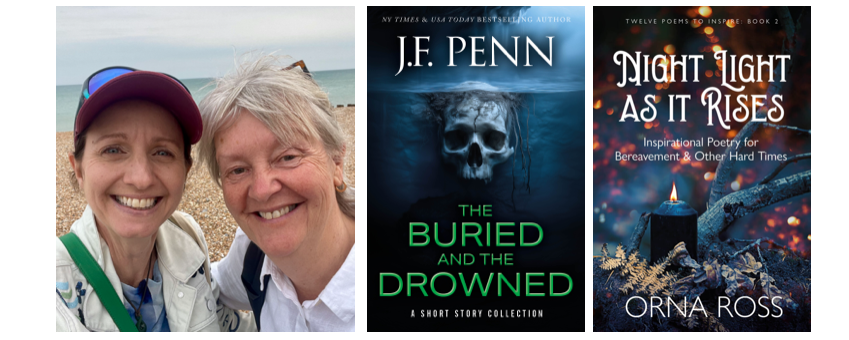Writing And Publishing Short Stories And Poetry With J.F. Penn And Orna Ross
Description
How do you know when an idea should become a poem or a short story instead of a longer work? How can indie authors publish and market poetry and short fiction in today's market? Joanna Penn and Orna Ross explore the creative processes, and the business behind writing short-form work, and discuss why being authentically human matters more than ever in our AI-driven world.
In the intro, How publishing has changed since 2015 [Jane Friedman];
The Two Authors Podcast; Anthropic settles piracy copyright lawsuit [WIRED; The New Publishing Standard]; AI-Assisted Artisan Author webinars; The Buried and the Drowned out now; Long distance walking and resilience at midlife [Books and Travel]
Today's show is sponsored by Draft2Digital, self-publishing with support, where you can get free formatting, free distribution to multiple stores, and a host of other benefits. Just go to www.draft2digital.com to get started.
This show is also supported by my Patrons. Join my Community at Patreon.com/thecreativepenn
<figure class="wp-block-image size-full">
 </figure>
</figure>Orna Ross is a multi-award-winning historical fiction novelist, poet, non-fiction author, and the founder of the Alliance of Independent Authors. Her latest poetry collection is Night Light As It Rises.
J.F. Penn is the Award winning, New York Times and USA Today bestselling author of thrillers, dark fantasy, crime, horror, and travel memoir. Her short story collection, The Buried and the Drowned, is out now.
This discussion was originally published on the Self-Publishing with ALLi Podcast in July 2025.
- How poems “choose” their writers and the difference between emotion-driven poetry and character/place-driven short stories
- W.B. Yeats' prose outline technique for poetry and why it helps writers actually finish their poems
- The challenges and rewards of creating print collections through Kickstarter for niche audiences
- Why submission to magazines isn't the only path—the case for direct publishing and building reader relationships
- Marketing strategies specific to poetry and short fiction, from video content to reader teams
- The importance of professional editing and beautiful book design for short-form collections
You can find Orna at OrnaRoss.com and Jo at JFPennBooks.com and BooksAndTravel.page. You can find The Buried and the Drowned at: www.JFPenn.com/buried. You can find Night Light As It Rises here.
Transcript of the discussion
Jo: Today we are going to be talking about what we've both been working on recently. Actually, we've got a lot of craft-related discussion going on today as we talk about writing, publishing and marketing poetry and short fiction.
There are writing craft things in today's show and also business aspects. I had this idea about this show because Orna, you shared a poem written about your mom's death on your Go Creative podcast, and I did tear up and I'm sure a lot of people listening would've teared up too, and it must have been really hard to write. So I wanted to ask you —
Why did you decide to write a poem about this really difficult topic, and how do you know when something should be a poem as opposed to something longer?
Orna: So poems pick me rather than me deciding. I don't actually, with longer work, I will make a decision. I'm going to do a book on such and such, but poems kind of come along or they don't.
And so this one arrived and that's why I decided to do it. In terms of why I decided to share it, which is a relatively new thing for me to do, and certainly new to do on the Go Creative podcast, something I am going to be doing going forward and share the poetry. I'm challenging myself at the moment to kind of go out there more and share those things.
Typically I would have just shared that with my poetry patrons. I wouldn't have gone any further with it. So now I'm trying to just be more human in the world of AI as you and I talk about a lot, that whole double down on being human thing. Well, you know, reading a poem that you've written yourself is probably about as human as it gets and that's why I decided to share it.
Then in terms of how do you know whether something's a poem or something longer for me, and again, I think it's really personal for each different writer, but for me —
Lyrical poems are short and just a single flash of feeling and image coming together for concentrated emotion.
If I can sense the whole experience in just one vivid moment kind of thing, that's a poem for me rather than an essay or a story.
So there'd be an image and there'd be a feeling, rather than, there may be an idea as well, but the image and the feeling are the main thing. If plots start coming in or characters, memory, side stories, anything like that, then it's a bigger thing, much bigger thing. Usually for me, novels and all. But one scene, one beat. That's poetry.
Jo: And you mentioned there about the doubling down of being human. And of course this poem about the death of your mother —
You can't get much more human than a poem about the death of your mother.
I mean, AI could generate something, but that is a human experience, right?
Orna: Yes, 100%. And I believe that this is a personal belief of mine as a writer, is one of my sort of writing credo. That the feeling and emotion and experiences that you're having while you're writing a poem that opens you out, that in some way that is conveyed to the reader who then experiences.
Not exactly the same. They're going to bring their own stuff to it, but they're going to have a sense of that humanity in the poem. I do feel that is something that can't be replicated. Very hard to describe, very hard to explain where it, where it comes, where you see it in the text, but I believe it's there.
But yeah, short stories are similar. You've been writing short stories recently and —
How do you know when an idea is a short story or a longer story or a novel?
Jo: I normally have like a story seed and I guess I have story seeds for novels as well. And I want to explore that.
But usually there has to be some kind of twist. So when I was growing up, I mean, I still read them sometimes, Roald Dahl's Tales of the Unexpected, which I loved. And if people have an idea of Roald Dahl, I know in some ways he has been critiqued these days, but pretty dark children's writing as well.
But the T






